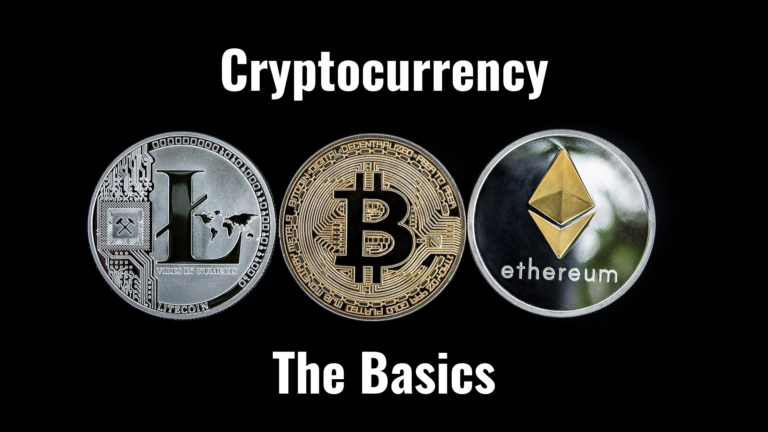Cryptocurrency
Unless you’ve been living under a rock, you’ve most likely heard the word “cryptocurrency” or “crypto” used plenty of times over the last couple years. Today we’ll be talking about the revolutionary cryptocurrency phenomenon as well as suggesting a few resources to get you started.
What Is Cryptocurrency?

Essentially, cryptocurrency is digital currency. Its name is derived from cryptography, which is the process used to keep cryptocurrencies safe. Cryptography is the art of protecting, or encrypting, messages and other digital entities through coding and complex algorithms.
Cryptocurrency started with Bitcoin (BTC) in 2009 after the financial crisis of 2008. Since then, more and more cryptocurrencies have been created, each with their own names and purposes. While cryptocurrencies are technically meant to be used as a payment method between private buyers and sellers, there is still only a small number of individuals and companies who accept crypto as payment. A much larger amount of people, however, use cryptocurrencies as an investment. A growing number of brokerages offer Bitcoin and other cryptos as investment options, and there are also cryptocurrency exchanges designed to let you use crypto as both a currency and an investment.
Before we get started, let’s go over two quick vocab terms. Firstly, the word altcoin essentially refers to any cryptocurrency other than Bitcoin. This really goes to show you that Bitcoin is the standard for crypto. Secondly, a stablecoin is a cryptocurrency whose value is pegged to the value of another asset, such as a country’s currency, precious metals, or even another cryptocurrency. Stablecoins are meant to provide crypto investors some protection from the volatility of unpegged cryptocurrencies, hence the name.
What’s the Point?
To many, cryptocurrency isn’t just another type of money that should be seen in the same way as cash, checks, debit cards, or credit cards. Many see cryptocurrency as the money of the future, something that will revolutionize the way that we conduct private transactions as well as the financial system as a whole.
Most cryptocurrencies utilize blockchains to verify their transactions. The blockchain is public ledger that involves a network of computers verifying the validity of transactions, instead of that verification being done by a big institution like a bank or credit union. This is important because through blockchain, cryptocurrency is bringing a new feature to the world’s financial system: decentralization. Since cryptocurrency is so decentralized, it’s basically impossible for federal governments to manipulate the money supply. When it comes to monetary policy in the United States, the Federal Reserve has the ability to print money, take it out of circulation, and perform a number of other measures that are meant to stabilize the economy. This can be seen as a good thing or a bad thing, depending on your views on the financial system. Regardless, the point of cryptocurrency is that it’s essentially immune to this type of manipulation and can therefore be seen as a more trustworthy way to conduct transactions.
While cryptocurrency has built-in protection from regulation and manipulation due to its decentralized nature, some countries such as the UK and China are taking measures to keep crypto outside of their borders entirely.
Most Popular Cryptocurrencies

- Bitcoin was started in 2009 by an anonymous person or group with the alias Satoshi Nakamoto. Bitcoin started the cryptocurrency revolution and now represents over 60 percent of all the cryptocurrency in the world.
- Ether is the cryptocurrency of Ethereum, one of the most popular blockchains in the world. It is second in popularity and value to Bitcoin.
- XRP is the cryptocurrency of Ripple, a system used to perform financial transactions.
- Litecoin is much smaller than Bitcoin, but is very safe and allows for even faster transactions.
- Tether is possibly the most popular stablecoin, as it is tied to the value of the U.S. dollar.
Most Popular Cryptocurrency Apps
There are plenty of apps out there that you can use to buy, sell, and even secure loans with cryptocurrency. Here are some of the most popular cryptocurrency apps:
Coinbase is one of the most popular cryptocurrency exchanges on the market and is a phenomenal choice for beginners. With a simple, sleek user interface and over 25 supported cryptocurrencies, Coinbase is a great way to get your foot in the metaphorical crypto door. Users can buy and sell plenty of cryptocurrencies on Coinbase, and those who want more advanced features can sign up for the premium plan, Coinbase Pro.
Cash App is owned by Square and is known for its peer-to-peer payment features. You can send money, receive money, open a bank account, and even invest through Cash App. The reason Cash App is on this list is because it lets you use Bitcoin as a payment method, not just an investment. While Bitcoin is currently the only supported cryptocurrency for transactions and investments on the app, it’s worth noting that Cash App lets you send and receive BTC. Read our full Cash App review for more information.
Kraken is another great cryptocurrency exchange with a good range of cryptos to trade. With over 50 cryptocurrencies and some fancier trading tools offered, Kraken makes a great choice for intermediate to advanced crypto traders.
Final Thoughts
Cryptocurrency is still a relatively new addition to the world of finance and its future is unknown. Crypto enthusiasts claim that cryptocurrencies are the money of the future, while skeptics say that the only purpose of crypto is to allow criminals to execute payments anonymously. Ultimately, it’s up to you to decide what you think of cryptocurrency and whether or not you want to add it to your portfolio.
We are experienced users of dozens of stock trading platforms. We stay up to date on these platforms' service offerings, subscription fees, trade commissions, and welcome bonuses. The brokerages listed below are for U.S.-based investors, and are ranked in order of overall value received after taking advantage of their sign-up and/or referral offers. ✅ U.S. stocks, ETFs, options, and cryptos $3 monthly sub 10k in assets Growth $3; + $9 Month Bronze $3; Silver $6; Gold $12 a monthThe Best U.S. Brokerages as of June 30, 2025
Ranking of Top U.S. Stock Brokerages Based on Fees, Features, and Sign-Up Bonuses
Rank
Brokerage
Fees
Features
Sign-Up Bonus
Read Our Review
1.

$0
✅ Now 23,000,000 users
✅ Cash management account and credit cardFree stock up to $200 with new account, plus up to $1,500 more in free stock from referrals
Robinhood Review
2.
Moomoo
$0
✅ Free Level 2 Nasdaq quotes for advanced traders
✅ Access to U.S. and Hong Kong markets
✅ Learning tools built in60 free stocks with $5k deposit; or 25 free stocks with $2k deposit
Moomoo Review
3.
Interactive Brokers
$0
✅ Access 150+ global stock exchanges
✅ IBKR Lite & Pro tiers for different experience levels
✅ SmartRouting™ and deep analytics for executionRefer a Friend and Get $200
Interactive Brokers Review
4.
M1 Finance
✅ Automated investing “Pies” with fractional shares
✅ Integrated banking & low-interest borrowing
✅ No trading fees with scheduled trades$75-$500 Tiered Sign-up bonus
M1 Finance Review
5.
Webull
$0
✅ Extended-hours trading premarket and after-hours
✅ Built-in technical charts, screeners, and indicators
✅ Commission-free options trading$10 and a 30-day complimentary subscription to Webull premium;
$200-$30,0000 Tiered Sign up bonusWebull Review
6.
Public
$0
✅ Fractional shares of U.S. stocks and ETFs
✅ No payment for order flow (PFOF) model
✅ “Alpha” tool with earnings calls and sentiment data$100-$10,000 Tiered Cash Account Transfer Bonus
Public Review
7.
Composer
$32 a month
✅ Invest in fully automated stock strategies
✅ Build custom strategies with our no-code builder
✅ IRAs$49 per successful referral with no limit on the number of referrals
Composer Review
8.
Stash
✅ Stock-Back® debit card rewards in fractional shares
✅ Auto-invest and budgeting tools for beginners
✅ Curated theme portfolios for retail investors$5 when you invest $5
Stash Review
9.
Acorns
✅ Automated investing portfolios
✅ ESG curated portfolios
✅ Retirement Accounts
✅ Acorns Early Invest for Kids' AccountsGet a $20 bonus when you start saving & investing
Acorns Review
10.
Etoro
$0
✅ CopyTrading™ feature to follow top traders
✅ Trade U.S. stocks, ETFs, and crypto in one app
✅ Commission-free trades with themed portfolios$10 Crypto Sign-Up Bonus
Etoro Review
11.
Robinhood Gold
$5
✅ 4% APY on cash
✅ 3% IRA match
✅ Level II data; Morningstar
✅ No interest on first $1,000 of margin Save with Annual Fee
Robinhood Gold Review
12.
Cash App
$0
✅ U.S. stocks and bitcoin; $1 minimum
✅ Peer-to-peer payments
✅ Beginner-friendly financial ecosystemUp to $200 in free overdraft coverage and earn 4% on cash
Cash App Review
Fees, features, sign-up bonuses, and referral bonuses are accurate as of May 31, 2025. All information listed above is subject to change.
